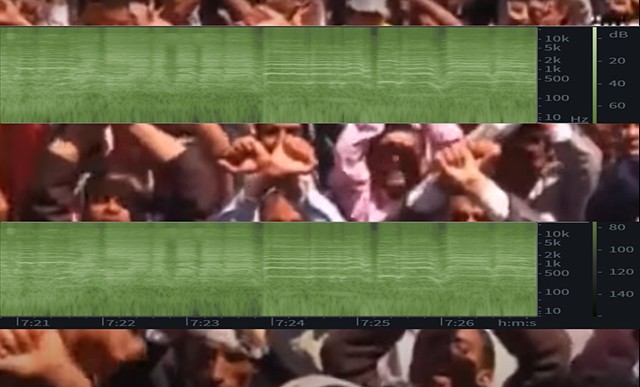Michael Lazar/Maayan Tsadka

Maayan Tsadka
Selected by Michael Lazar
Persistence, Resistance, Resonance – A Partial Anthology of Protest Chants
Soundscape (8:19 mins)
“Sound cannot travel in a vacuum, physically or socially. The ways in which sound operates are a result of its acoustic properties and the way in which it interacts with its surroundings.”
Maayan Tsadka's sound installation, Persistence, Resistance, Resonance, serves as a spatial and temporal anthology, capturing the essence of protest chants spanning continents and decades. Through an intricate interplay of sounds and narratives, Tsadka brings to life the significance of preserving and uncovering the unifying power of the simple chant. These chants, utilized in various social and cultural contexts, employ rhythms and beats to engage, organize, and mobilize people, representing powerful expressions of resistance and solidarity. Despite their unique subject matter, languages, and cultural backgrounds, the archive unveils surprising similarities that transcend boundaries of time and place. These similarities are not coincidental; they resonate with the primal rhythms of our existence—heartbeats, breaths, and the communal actions that bind us together, such as repetition and collective gatherings. The prevalence of similar rhythms across different languages and cultures worldwide prompts us to ponder the existence of a potential "universal protest rhythm" or even a broader, universally resonating rhythm that mobilizes crowds. Tsadka’s piece poses intriguing questions about the nature of archives and their significance in shaping our understanding of the past. It encourages visitors to contemplate the stories behind these archival artifacts, the voices that have been silenced, and the narratives that have been marginalized. By engaging with these remnants of collective memory, we are prompted to reflect on the power dynamics that determine what is preserved, what is forgotten, and who gets to tell their story.
Chants include: 1960s University of Connecticut (USA); 1963 Antiwar protests (USA); 1968 Black Panthers (USA); 1968 Columbia University (USA); 1968 Paris (France); 1970s Black Panthers (Israel); 1973 Chile; 1980s Palestine; 1999 Seattle Washington (USA); 2011 Yemen; 2011 Madison Wisconsin (USA); 2011 Arab Spring; 2012 Jerusalem (Israel); 2014 Bil’in Palestine; 2015 Damascus (Syria).